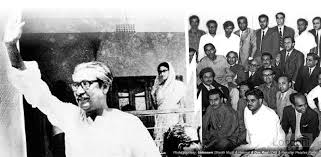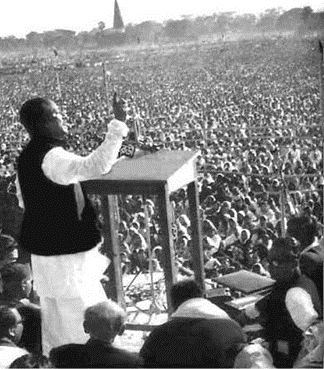In the previous articles we have learnt about society, government and citizens' rights and duties in the state. In addition, we have learnt about various problems and solutions to these problems in the civic life. In this article, we shall learn about the role of citizens in the establishment of the independent Bangladesh.
After studying this article, we would be able to-
• know and explain the independence struggle of Bangladesh, Language
Movement, the ideologies of the Liberation War and its essence and non-communal
values;
• comprehend and explain the importance of patriotism.
Background to Independence Struggle of Bangladesh
Today we are all Bangladeshi citizens. Before the independence
in 1971, we were citizens of Pakistan. Despite being the majority (56%) at that
time the people in East Bengal (now Bangladesh) had been deprived of their
political, economic and cultural rights as citizens. After the independence of
Bangladesh, Bangalis have now been enjoying their citizenship rights
independently.
Before the Pakistani rule (1947-1971), the region of Bangladesh
had been under the control of Turkey, Afghan, Mughal and lastly the British
Rule (1757-1947). During the British rule, a class of Western-educated
leadership emerged in this country. This leadership developed in the spheres of
politics, organizations, social reforms, jobs, language- literature and culture
and education and so on. Another aspect of British rule is its constitutional
reforms beginning from 1861. In course of this development, people achieved
their voting rights. All these were mentionable steps in promoting and
enhancing citizen rights and consciousness.
- 1940 Lahore resolution
- Language Movement (1948-1952)
- 1954 Election
- 6-Points Program
- 1969's Mass Uprising
- 1970 Election and Its Results
Non-Cooperation Movement
On 1 March, 1971 President Yahyia Khan suspended the Pakistan National Assembly session for an indefinite period. In protest, Bangabandhu Sheikh Mujibur Rahman called for a hartal all over East Bengal. Virtually, a non-cooperation movement was launched against Pakistani rule from 1 March 1971. Curfew was declared at night on 2 March. Students and people broke the curfew. The military force shot at them. In protest, the whole Bangladesh woke up in resistance. The rise of Bangali nation occurred. Bangabandhu Sheikh Mujibur Rahman was the 'Father of the Nation'. 'Joy Bangla' was the slogan for liberation ofthis nation. Uprisings spread around with sky-wrecking slogan: 'Valiant Bangalis, take up arms and liberate Bangladesh'.
On March 2, 1971 the flag of independent Bangladesh was hoisted
at the Banyan ground of Dhaka University in the gathering of students and
people and on 3 March 'Declaration of Independent Bangladesh' was read out at
the mass-gathering held at the Paltan ground, and 'Formation of Independent Bangladesh
Central Students Action Committee' took place and on 23 March the flag of
independent Bangladesh was hoisted in all parts of East Pakistan instead of
Pakistan flag on the occasion of the Pakistan's Republic day bearing the
testimony of the rise of Bangali nation.
From March 2, 1971 to March 25, 1971 an all-out non-cooperation was
observed over the country at the call of Bangabaodhn. During this period, all
government and non-government offices, secretariat, autonomous institutions, high
court, police administration, banks and insurance, business and transport
defied government orders and were run following the directions of Bangabandhu.
March 7, 1971 was an unforgettable day in the Bangali national
life. On that day, at the Race Course Maidan (presently Suhrawardy Uddyan) in a
spontaneous gathering of lacs of people, Bangabandhu Sheikh Mujibur Rahman gave
an important speech.
In this speech, he announced-
"Make every house a
fortress. Face the enemy with whatever you
have. As we have spilled blood, we shall spill
more blood. We must liberate the people of this country, if God wills. Our struggle is the struggle for liberation, our struggle
is the struggle for independence. Joy Bangla (Long live
Bangla)"
Yahiya came to Dhaka on 15 March, 1971. He requested Bangabandhu
Sheikh Mujibm Rahman to sit for a dialogue. Negotiation began on 16 March. Iulfiqar
Ali Bhutto along with some leaders from West Pakistan took part in the negotiation.
But the main objective of Pakistani rulers was to waste time in the name of negotiations.
However, their chief objective was to stop forever the independence struggle of
Bengalis by importing troops and other supplies from Pakistan. On 23 March, at
the call of Bangabandhu, the flag of ‘Shadhin Bangla’ was hoisted at every
house in East Pakistan while the day was ‘Pakistan Republic Day’. The Awami
League leaders made their last attempt to resolve the crisis. But Yahiya Khan,
making no announcement, left Dhaka with his cohort and ordered Pakistani troops
on that night to swoop on the unarmed Bengalis. Along with Dhaka, they
mercilessly killed innocent and unarmed Bangalis in many other cities. The
night is called the Black Night in the history of Bangladesh.
Declaration of Independence
On this black night (25 March) in the first part of 26 March, just
before his arrest, Bangabandhu declared independence. The declaration was made
in English so that the whole world could understand the message. He said: “This
may be my last message, from today Bangladesh is independent. I am calling the people
of Bangladesh, wherever you might be, with whatever you have, you will resist
the army of occupation with all your power. Your fight must go on until the
last solider of Pakistan occupation army is expelled from the land of
Bangladesh and the final victory is achieved.” (Bangladesh Gazette, 15th amendment
to the Bangladesh Constitution, 3 July 2011). This declaration was transmitted
thought the EPR’s Transmitter, Telegram and Teleprinter. Bangabandhu’s
declaration of independence was announced at midday of 26 March by Chittagong’s
Awami League leader M A Hannan from Chittagong Radio station. The second announcement
was made in the evening from Kalurghat Radio Station. Bangabandhu’s declaration
of independence received widespread support from Bangali Military, paramilitary
and civilian forces. Thus, it inspired the freedom-loving people.
1971 's War of Liberation and Gaining Independence
On 10 April, 1971 the elected Peoples' Representatives of Awami
League decreed the Order of the Declaration of Independence at Mujibnagar (at
the Mango garden of Baiddanathtala in Meherpur district) and formed a
government which is known as Mujibnagar Government. The Mujibnagar government
comprising the Peoples' Representatives took oath on 17 April. After the
formation of Mujibnagar government, people in groups joined Muktibahini
(Freedom fighters) and began to join the war of liberation.
Internal Resistance and Guerrilla attack
At midnight of March 25, Pakistani troops attacked Dhaka city by
firing and setting fire. They killed the sleeping people in dark of night. They
attacked Iqbal Hall (at present Jahurul Haque Hall), Salimullah Muslim Hall and
Jagannath Hall of Dhaka University. There, they raided the teachers' quarters
and killed many people. Yahyia's barbarian troops were engaged in
indiscriminate killing of the people, torturing women, arsons, looting and in
many other hateful crimes. To escape from their attacks, lacs of male and
female people took shelter in India. But Bangali students and youths received
training in secret in large numbers and started guerilla warfare from within the
country and beat the Pak army in frontal attacks. The people assisted them by giving
food, shelter and clothes. As a result, the Pak army became seized.
Organization and operation of the War of Liberation
In the primary stage of the War of Liberation, resistance
movement was going on unplanned and uncoordinated. With the formation of
Mujibnagar government, the War of Liberation began to operate in an organized
way.
Regular military battalion was formed comprising the then
Bangali members of EPR, Bangali soldiers and officers in the Pakistan army.
Three Brigades were later formed with regular military battalions known as
K-force, S-force and Z-force. Military members and other freedom fighters
gained recognition as Freedom Fighters. At times they were known as Guerrilla.
The members of this force played a significant role in the War of Liberation.
They participated in the guerrilla war within the country against the Pakistan
occupation forces. Their detective branch conducted surveillance over the
movement and activities of Pakistan occupation forces and supplied information
to the freedom fighters. Among the guerrillas, students and farmers were the
greatest in number.
Mujibnagar government divided Bangladesh into eleven sectors and
put a commander in charge of a sector. Under the sector commander, both regular
forces and irregular guerrillas were engaged. Sector ten did not have a
regional boundary. This consisted of Navy Commanders.
Using a mix of conventional and guerilla warfare tactics Freedom
fighters defeated the Pakistan occupation forces. Non stop, war lowered the
morale of Pakistani occupation forces and made them utterly frustrated and
isolated from the people.
Pakistani military ruler President Yahiya Khan launched air
strike on India in a bid to show Bangladesh’s independence war as a war between
Pakistan and India. On 3rd December Pakistan government declared war against India.
But their attempts ended in failure. On 4 December, Indian Loksabha
(parliament) decided to give recognition on December 6. At this time, a Joint
Command was established comprising Freedom fighters (Mukti Bahini) and regular
members of Indian army. This joint command launched attacks from three sides
such as naval, air and land. Consequently, Pakistan occupation forces were
completely destroyed and defeated within a few days.
At last, on 16 December, 1971 the commander in Chief of the
Pakistani forces General Niazi along with 93,000 soldiers, a huge chunk of
supplies and artillery formally surrendered at the then Race Course Maidan. The
name of Bangladesh was thus written in letters of blood on the map of the world
as an independent and sovereign state.
In nine months War of Liberation, 3 millions of Bangalis
irrespective of sex, religion and age lost their lives. 2,76,000 women lost
their dignity. Villages after villages were set on fire. 1 crore people left
the country and took shelter in India. Gaining this liberation, Bangladesh
emerged as an independent and sovereign country in the world map. Prior to
achieving independence, the local accomplices of Pakistan occupation forces
took the best intellectuals of the country to the Rayer Bazar and Mirpur
killing grounds and brutally killed them. On the whole, despite being the majority
in Pakistan Bangalis were treated as second class citizens. With independence, they
became independent citizens in independent Bangladesh.
Spirit of the Liberation War and Its Ideals
Bangladesh is the first country in the third world which gained
independence through an armed struggle. That war lasted for nine months. At the
cost of much spilling of blood and sacrifices, we gained independence. The
first constitution enacted after independence rightly embodied the sprit of the
war of liberation and its ideals through four principles of the state.These
four principles are: democracy, socialism, secularism and nationalism. The
Bangalis have struggled for democracy for long. To make Bangladesh a truly
democratic state was their dream. The main objective was to free themselves
from all kinds of exploitation and discrimination. Since inception of Pakistan
state, Bangalis have struggled against the use of religion by the rulers. In
other words, they have struggled against communalism. 'Religion is personal,
state is for all' -with this essence in mind they have taken part in the War of
Liberation. The essence of our independence was exclusive national identity,
which we call Bangali nationalism. For a separate nation, an independent state
is required. Bangali national identity includes our own territory, literature
and language, non-communal or tolerant culture and history and tradition. The
spirit and ideals of the War of Liberation lie in the ownership of state power.
During Pakistan period, state was the institution of civil and military
bureaucracy and opportunist groups. People of all walks of life in our country
have taken part in the War of Liberation. They are the owners of the state. Therefore,
it has been declared in our constitution that 'People are the sources of all
power of the Republic' Article-7(1). Today, our duty is to make Bangladesh a
happy and prosperous state.


